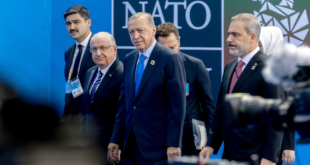BAGHDAD (Reuters) — US forces hunting kidnapped American journalist Jill Carroll are raiding Iraqi homes in a race against time but, as with much of their counter-insurgency war, face the dilemma that their tactics can foster resentment.
Operations designed to take her captors by surprise have angered those Iraqis who say troops have blasted their way into their homes, put sacks over their heads and detained their relatives in the search for Carroll, who was abducted on January 7.
One such raid, shortly after the reporter was seized, targeted one of Baghdad’s biggest Sunni mosques, the sight of troops descending on ropes from helicopters and storming through the compound infuriated Sunni political leaders and drew condemnation from the United Nations envoy to Iraq.
Lieutenant Colonel Barry Johnson, chief spokesman for the US military, said troops risk putting the lives of hostages and themselves in danger if they do not move quickly.
“Speed is essential in any raid. It may scare or inconvenience people but it is necessary in an environment where we are fighting insurgents and terrorists. If houses are damaged we have a comprehensive compensation programme,” he said.
Carroll’s high-profile case has focused on negotiating efforts to win her release, but what is happening on the ground in Baghdad illustrates the wider challenge facing US troops to gather accurate intelligence and act against shadowy guerrilla groups and criminal gangs hidden among the general population.
Tracking rebels may require raids and overwhelming force but, if misdirected or mishandled, can undermine efforts to win Iraqi allies in the fight against the insurgency.
Aware that Carroll’s militant captors threatened to kill her if the authorities did not release women prisoners by Friday, US troops have stormed homes in several areas of Baghdad. How many homes they have raided in the hunt is not clear.
In a typical instance, the Nazih family heard movements in their garden just after midnight. But they had no time to check.
“My son was in the garden so I went around the back door to see what was happening and suddenly American soldiers pointed rifles at us,” said Hamdiya Sabri, 55.
“Then all of a sudden we heard an explosion. They blew open the front door and fired stun grenades into the living room.
They rounded us up and threw me on the floor and a soldier put me on the floor and kept his boot on my back. Why?”
Hunt for hostage
Two of her other sons said US troops asked if they knew anything about the neighbours and then they asked about Carroll, a 28-year-old reporter for the Christian Science Monitor.
“They told us that they had a tip that the American journalist was being held in this area and asked me what I thought of her,” said Thamir Nazih, 40.
“I said I was sympathetic about Jill Carroll and that she is innocent. Then they asked me if I knew any terrorists — this only after they stormed the house and humiliated my family.” After the search, a US soldier promised $300 compensation and apologised, saying troops had acted on a faulty tip.
The soldiers took away Jassim, the youngest son of the family, saying he would be questioned and freed in a day or two.
The soldiers then descended on the Nazihs’ neighbours in the Ghazaliya section of Baghdad, where insurgents are active.
“They barged into our home then they pulled me by the hair. I kept telling them we had a baby. Then a soldier went into the room where my brother was sleeping near the baby and they punched my brother in the face,” said Hubaab Hamid.
 Eurasia Press & News
Eurasia Press & News



